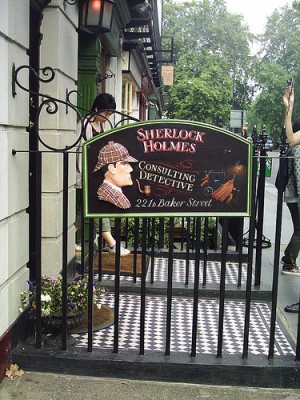
Yesterday I was officially initiated into the society of the Baker Street Irregulars. It wasn’t actually an official induction—I would probably have to be in London for that to occur, not to mention, be a little bit more informed in their field of expertise—but I considered my professor’s proclamation that I belonged with this esteemed group of Sherlock Holmes fanatics as a major compliment.
Perhaps I should disclose the circumstances for my Detective Fiction professor’s observation, but forgive me if my newly acquired title as a Baker Street Irregular has influenced my writing by compelling me to gradually divulge essential details, Watson-style. The truth is I know very little about Sir Arthur Conan Doyle’s Sherlock Holmes series. Thus far, I have read but three of the war veteran doctor’s narratives about his eccentric, private detective roommate.
My assignment for yesterday’s class was to write a response paper on any aspect of The Sign of Four, the second of Doyle’s short stories in the detective series. I decided to focus entirely on the character of Sherlock Holmes because he is, after all, the protagonist, and in my opinion, the most interesting subject. I must admit, however, that my choice of topic for the assignment was also influenced by a personal identification I experienced with Holmes, though I did not reveal this detail in my homework, in fear that the professor would consider me a drug addict (but more on that later).
In the spirit of exposing evidence little by little, so as to keep the reader in suspense, I will state that for the past few months I have suspected myself of having the condition known as Attention Deficit Disorder (ADD). For this reason, I have been conducting research—an investigation of sorts—in order to either confirm or negate my hypothesis. To this purpose, I have read all of ADD specialist Dr. Ned Hallowell’s books on the condition, in addition to attending a consultation with him and exploring his website (one might say I am as thorough as Mr. Holmes himself). From my studies, I have become quite familiar with the subject and therefore very perceptive to the manifestation of the symptoms of ADD in myself and in others.
Thus, it was to my outmost delight, that in Sherlock Holmes’ description of his restless temperament to the loyal Dr. Watson, the detective expresses word by word all the indications of ADD of which I have become such a connoisseur. The following is Holmes’ account of his own predispositions:
“My mind…rebels at stagnation. Give me problems, give me work, give me the
most abstruse cryptogram, or the most intricate analysis, and I am in my own
proper atmosphere. I can dispense then with artificial stimulants [i.e., cocaine].
But I abhor the dull routine of existence. I crave for mental exaltation.”[1]
It is with absolute confidence that I can state that if Sherlock Holmes had consulted Dr. Hallowell, the latter would not have hesitated in diagnosing the detective with ADD.
It is because of this hypothetical scene that my Detective Fiction professor (note Fiction, since I apparently failed to do so) publicly announced that I belong amongst the Baker Street Irregulars. They too, the professor informed the class, originally regarded Holmes as an actual living person and actually diagnosed him with Bipolar Disorder.
Not to say that I’m going to consider giving old Sherlock a call the next time I misplace my car keys, but I give myself some credit for being the first (I hope) to correctly diagnose this legendary man with a condition that he most probably has. But how is this in any way significant? Well, if I don’t possess the astounding deductive qualities of Sherlock Holmes, at least I can say that we share the diversion of a hyperactive mind. And, furthermore, if I dare to be a little bit arrogant (after all, Holmes can be himself quite conceited at times), I can say that I am mentally stronger than the detective, for I have not resorted to “artificial stimulants,” as he calls them, to entertain my mind.
[1] Doyle, Sir Arthur Conan. Sherlock Holmes: The Complete Novels and Short Stories, Volume 1, The Sign of Four. Random House, Inc: New York, NY. 2003.

Oh, I don’t think so. Holmes seemed much more bi-polar than ADHD.
And Hallowell isn’t exactly a top expert, though he is expert at promoting himself.